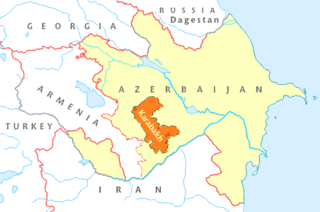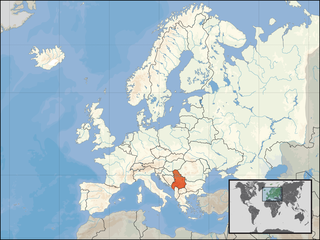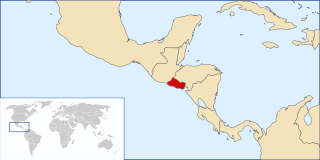
The United Nations Security Council (UNSC) is one of the six principal organs of the United Nations (UN) and is charged with ensuring international peace and security, recommending the admission of new UN members to the General Assembly, and approving any changes to the UN Charter. Its powers as outlined in the United Nations Charter include establishing peacekeeping operations, enacting international sanctions, and authorizing military action. The UNSC is the only UN body with authority to issue resolutions that are binding on member states.

The member states of the United Nations comprise 193 sovereign states. The United Nations (UN) is the world's largest intergovernmental organization. All members have equal representation in the UN General Assembly.

A United Nations Security Council resolution (UNSCR) is a United Nations resolution adopted by the Security Council (UNSC), the United Nations (UN) 15-member body charged with "primary responsibility for the maintenance of international peace and security".
A United Nations General Assembly resolution is a decision or declaration voted on by all member states of the United Nations in the General Assembly.

The United Nations Observer Mission in Georgia (UNOMIG) was established by United Nations Security Council Resolution 858 on 24 August 1993 to verify compliance with a 27 July 1993 ceasefire agreement between the Republic of Georgia and forces in Abkhazia with special attention given to the situation in the city of Sukhumi, Georgia. It was also to investigate reports of ceasefire violations, attempt to resolve such incidents with the parties involved, and to report to the Secretary-General of the United Nations on the implementation of its mandate. 88 military advisors were authorized to be deployed to the region. It ended on 15 June 2009, when Russia vetoed an extension of the mission. The last observers left the region on 15 July 2009.

United Nations Security Council resolution 1244, adopted on 10 June 1999, after recalling resolutions 1160 (1998), 1199 (1998), 1203 (1998) and 1239 (1999), authorised an international civil and military presence in the Federal Republic of Yugoslavia and established the United Nations Interim Administration Mission in Kosovo (UNMIK). It followed an agreement by Yugoslav President Slobodan Milošević to terms proposed by President of Finland Martti Ahtisaari and former Prime Minister of Russia Viktor Chernomyrdin on 8 June, involving withdrawal of all Yugoslav state forces from Kosovo.

United Nations Security Council Resolution 83, adopted on June 27, 1950, determined that the attack on the Republic of Korea by forces from North Korea constituted a breach of the peace. The Council called for an immediate cessation of hostilities and for the authorities in North Korea to withdraw their armed forces to the 38th parallel. They also noted the report by the United Nations Commission on Korea that stated North Korea's failure to comply with Security Council Resolution 82 and that urgent military measures were required to restore international peace and security.

United Nations Security Council resolution 874, adopted unanimously on 14 October 1993, reaffirmed sovereignty and territorial integrity of the Azerbaijani Republic and of all other States in the region, called for the preservation of the ceasefire, cessation of hostilities and withdrawal of forces from recently occupied districts of the Republic of Azerbaijan, and reaffirmed resolutions 822 (1993) and 853 (1993). The Council expressed its concern at "...the conflict in and around the Nagorny Karabakh region of the Azerbaijani Republic, and of the tensions between the Republic of Armenia and the Azerbaijani Republic...", and called upon the parties to observe the ceasefire agreed with by the government of Russia and OSCE Minsk Group.

United Nations Security Council resolution 777, adopted unanimously on 19 September 1992, after reaffirming Resolution 713 (1992) and all subsequent resolutions on the topic, the Council considered that, as the state known as the Socialist Federal Republic of Yugoslavia (SFRY) had ceased to exist, it noted that under Resolution 757 (1992), the claim by the Federal Republic of Yugoslavia to continue automatic membership in the United Nations was not widely accepted and so determined that membership of the SFRY in the United Nations could not continue. Therefore, the Council recommended to the General Assembly that the Federal Republic of Yugoslavia cease participation in the General Assembly and apply for membership in the United Nations.

United Nations Security Council resolution 784, adopted unanimously on 30 October 1992, after recalling resolutions 637 (1989), 693 (1991), 714 (1991) and 729 (1992), the council approved a decision by the Secretary-General Boutros Boutros-Ghali to extend the mandate of the United Nations Observer Mission in El Salvador (ONUSAL) for a further month until 30 November 1992.

United Nations Security Council resolution 821, adopted on 28 April 1993, after reaffirming Resolution 713 (1991) and all subsequent resolutions, the council also recalled resolutions 757 (1992), 777 (1992) and General Assembly Resolution 47/1 (1992) which stated that the state formerly known as the Socialist Federal Republic of Yugoslavia had ceased to exist and that it should apply for membership in the United Nations and until then should not participate in the General Assembly.

United Nations Security Council resolution 1003, adopted on 5 July 1995, after reaffirming all resolutions on the situation in the former Yugoslavia, in particular resolutions 943 (1994), 970 (1995) and 988 (1995), the Council noted measures by the Federal Republic of Yugoslavia to continue the border closure with Bosnia and Herzegovina and therefore extended the partial suspension of sanctions against Serbia and Montenegro for an additional 75 days until 18 September 1995.

United Nations Security Council resolution 1203, adopted on 24 October 1998, after recalling resolutions 1160 (1998) and 1199 (1998) on Kosovo, the Council demanded that the Federal Republic of Yugoslavia comply with previous Security Council resolutions and co-operate with the NATO and Organization for Security and Co-operation in Europe (OSCE) verification missions in Kosovo.

United Nations Security Council resolution 1522, adopted unanimously on 15 January 2004, after recalling all previous resolutions on the situation in the Democratic Republic of the Congo, the council welcomed efforts to establish the first integrated and unified brigade in Kisangani as a step towards forming a national army. It was the first Security Council resolution adopted in 2004.

United Nations Security Council Resolution 1654, adopted unanimously on January 31, 2006, after recalling previous resolutions concerning the situation in the Democratic Republic of the Congo, including resolutions 1616 (2005) and 1649 (2005), the Council extended the mandate of an expert panel monitoring the arms embargo against the country until July 31, 2006.

The permanent members of the United Nations Security Council are the five sovereign states to whom the UN Charter of 1945 grants a permanent seat on the UN Security Council: China, France, Russia, United Kingdom, and United States.

United Nations Security Council Resolution 2231 was a 20 July 2015 resolution endorsing the Joint Comprehensive Plan of Action on the nuclear program of Iran. It sets out an inspection process and schedule while also preparing for the removal of United Nations sanctions against Iran. The 15 nations on the Security Council unanimously endorsed the resolution, which had been negotiated by the permanent members of the United Nations Security Council—China, France, Russia, the United Kingdom, and the United States—plus Germany, the European Union, and Iran.













